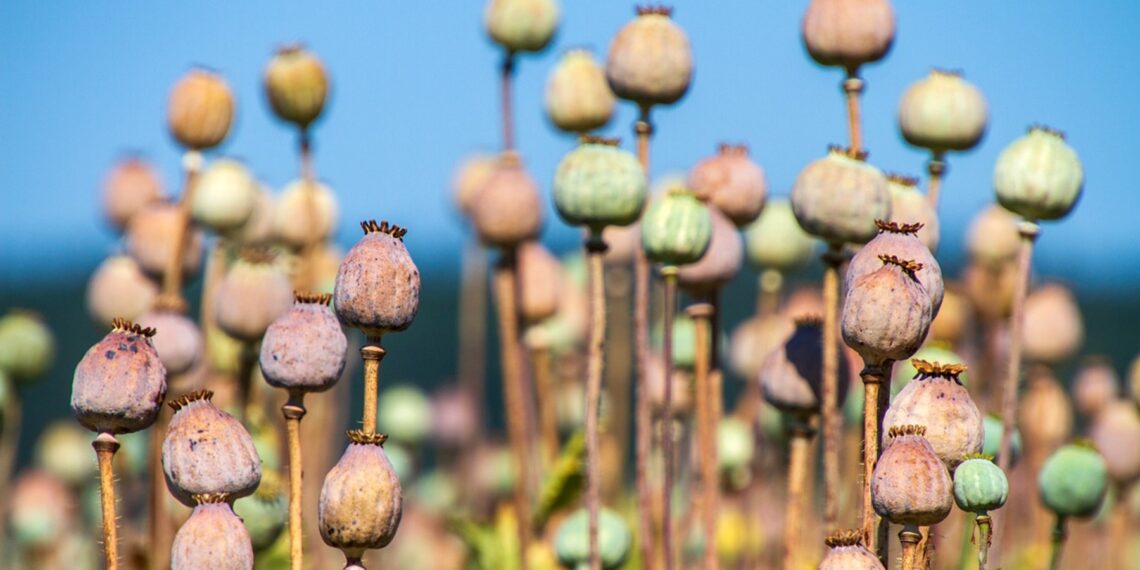In a significant effort to combat illegal drug cultivation, various law enforcement agencies, including the Manipur Police, have eradicated 19,135.60 acres of illegal poppy fields across 12 districts of the state between 2017 and 2024, according to an official report released on Monday.
The report, compiled by the Manipur Remote Sensing Applications Centre (MARSAC), reveals that the largest area of illicit poppy farming, 4,454.4 acres, was destroyed in Kangpokpi district over the past seven years. Other affected districts include Ukhrul, where 3,348 acres were cleared, and Churachandpur with 2,713.8 acres destroyed.
MARSAC, an autonomous body under the Planning Department of the Government of Manipur, tracked the destruction of illegal poppy cultivation in districts like Tengnoupal (2,575 acres), Chandel (1,982.5 acres), Senapati (1,682 acres), and Imphal East (737.9 acres). These 12 districts, mostly located in mountainous areas, account for the majority of the state’s illicit poppy fields.
The data also shows that the largest eradication efforts occurred during the years 2020-2021 (4,652 acres) and 2022-2023 (4,305.10 acres). According to the report, the total area under illegal poppy cultivation in nine districts—Chandel, Churachandpur, Kamjong, Kangpokpi, Noney, Senapati, Tamenglong, Tengnoupal, Ukhrul—was 28,598.91 acres in 2021-2022. This figure significantly dropped to 11,288.1 acres in 2023-2024.
In 2023-2024, the total area of poppy cultivation in the state decreased by 32.13 percent compared to the previous year. The acreage of illicit cultivation also saw a dramatic 60 percent decline between 2021 and 2023. This progress follows measures taken after the Anti-Narcotic Task Force’s first meeting on March 29, 2022, which led to MARSAC using GPS and remote sensing technologies to monitor poppy cultivation annually.
The report also highlights the environmental consequences of large-scale poppy farming, noting that deforestation linked to poppy cultivation has caused severe soil erosion, biodiversity loss, and climate change impacts.
Additionally, another government report details the state’s ongoing “War on Drugs” initiative, which has resulted in the seizure or destruction of drugs worth an estimated Rs 60,000 crore on the international market. The haul includes 304 kg of heroin, 3,775 kg of brown sugar, 1,804 kg of opium, 1,976 kg of Yaba tablets, and 422 kg of other substances such as ice crystal and pseudoephedrine.
The Manipur government has linked the rise in poppy cultivation to illegal immigrants from Myanmar, claiming these migrants have contributed to the ongoing ethnic strife in the state since May 2023. The government’s statement asserts that illegal immigrants have been involved in poppy cultivation and other illicit activities. Chief Minister N. Biren Singh’s “War on Drugs” campaign has intensified action against these illegal operations.
The government also pointed out the rapid increase in the number of villages in Kuki-dominated districts like Kangpokpi, Tengnoupal, Chandel, Churachandpur, and Pherzawl—an abnormal 122 percent rise from 731 to 1,624 villages since 1969. In contrast, Naga-dominated districts such as Tamenglong, Noney, Senapati, Ukhrul, and Kamjong saw only a 9 percent increase, from 527 to 576 villages over the same period. This surge in villages, many of which are located in forested areas, has contributed to the spread of illicit poppy farming, the government claims.















